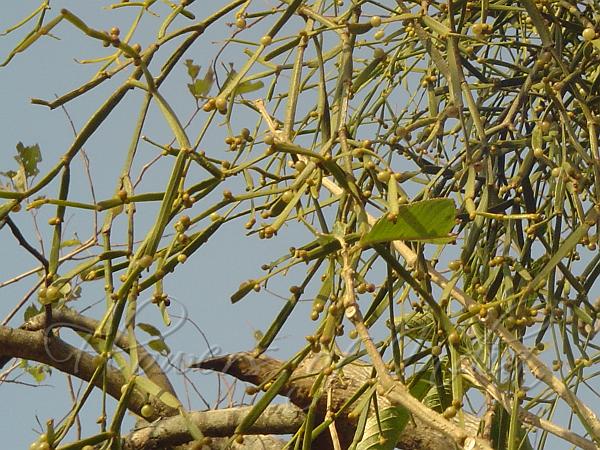|
| Leafless Mistletoe |
|

|

| File size | 547941 |
| Original date | 12/31/07 4:07 PM |
| Resolution | 2048 x 1360 |
| Flash | Flash did not fire |
| Focal length | 12.6mm |
| Exposure time | 1/250s |
| Aperture | 8.0 |
| Focus Distance | |
| Metering Mode | Spot |
| Camera make | SONY |
| Camera model | DSC-P52 |
| Sensor type |
|
|
|
|
Photo: Prashant Awale |
Botanical name: Viscum articulatum Family: Santalaceae (Sandalwood family)
Synonyms: Viscum nepalense
Synonyms: Viscum nepalense
Everyone has heard of Mistletoe but very few have actually seen this
semi-parasitic shrub, because it grows upon the branches of trees.
Leafless Mistletoe is a much branched, slender, smooth, pale, leafless
parasite, forming a green undershrub. The branches are flat, with pendulous
tufts, 15-90 cm long; the internodes being variable in length; usually a
trifle wider at the distal end, and striate. The leaves are visible only in
the very young internodes as small bracts below the flowers. The flowers
are very minute, stalkless, and in stalkless, 3-flowered spikes. There are
two or several spikes at a joint. The perianth of the male flowers is
reflexed, and hardly ¼ mm long. The female flowers are about 1/2 mm long,
with two bracts, and the perianth lobes erect and triangular. The fruit is
stalkless, nearly spherical, about 3 mm in diameter, white and shining when
ripe.
In Europe the mistletoe is well known for the Christmas custom of kissing
beneath its branches. It also features in the popular Asterix comic books,
where mistletoe collected from oaks was considered to have special
qualities. Flowering: December-January.
Medicinal uses: Leafless Mistletoe is used as a cure for fever. Paste is applied to cuts.
Leafless Mistletoe is used as a cure for fever. Paste is applied to cuts.
Medicinal uses:
 Leafless Mistletoe is used as a cure for fever. Paste is applied to cuts.
Leafless Mistletoe is used as a cure for fever. Paste is applied to cuts. | Identification credit: Tabish | Photographed in Maharashtra. |
• Is this flower misidentified? If yes,